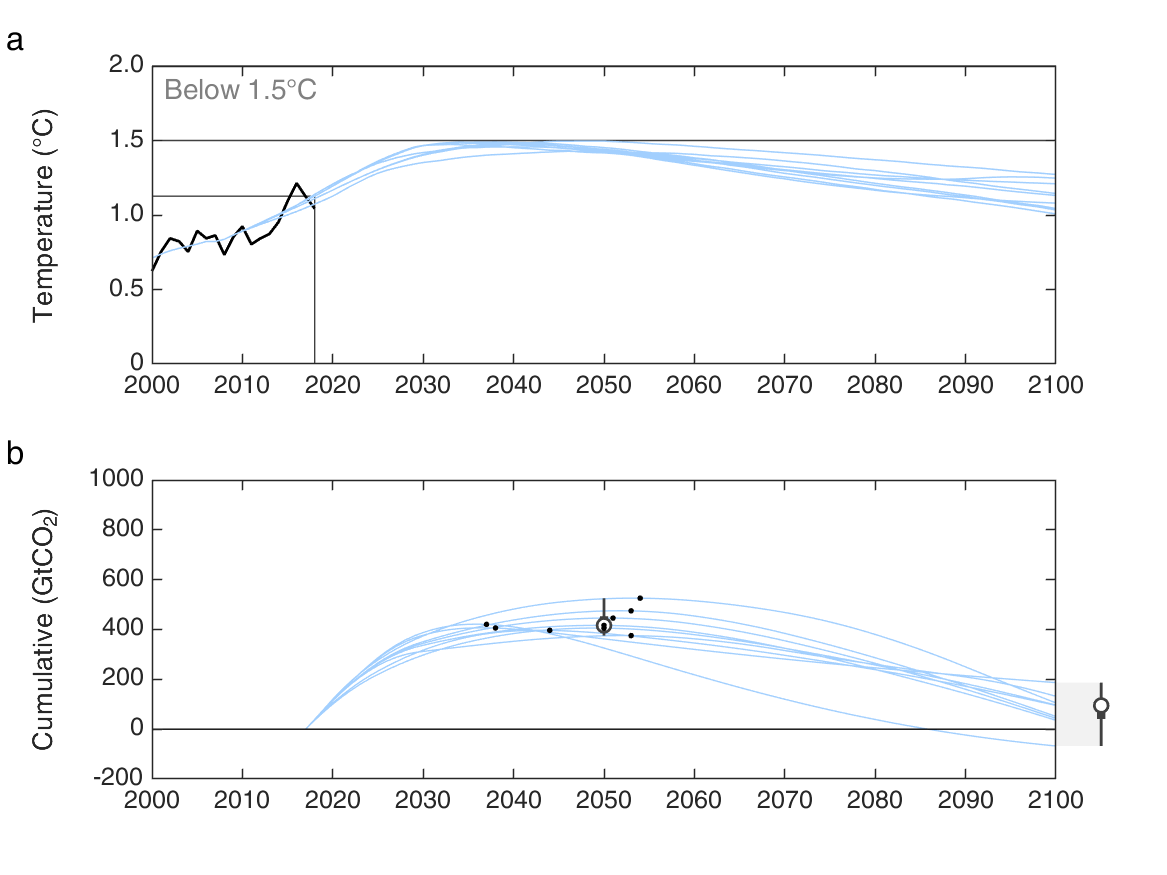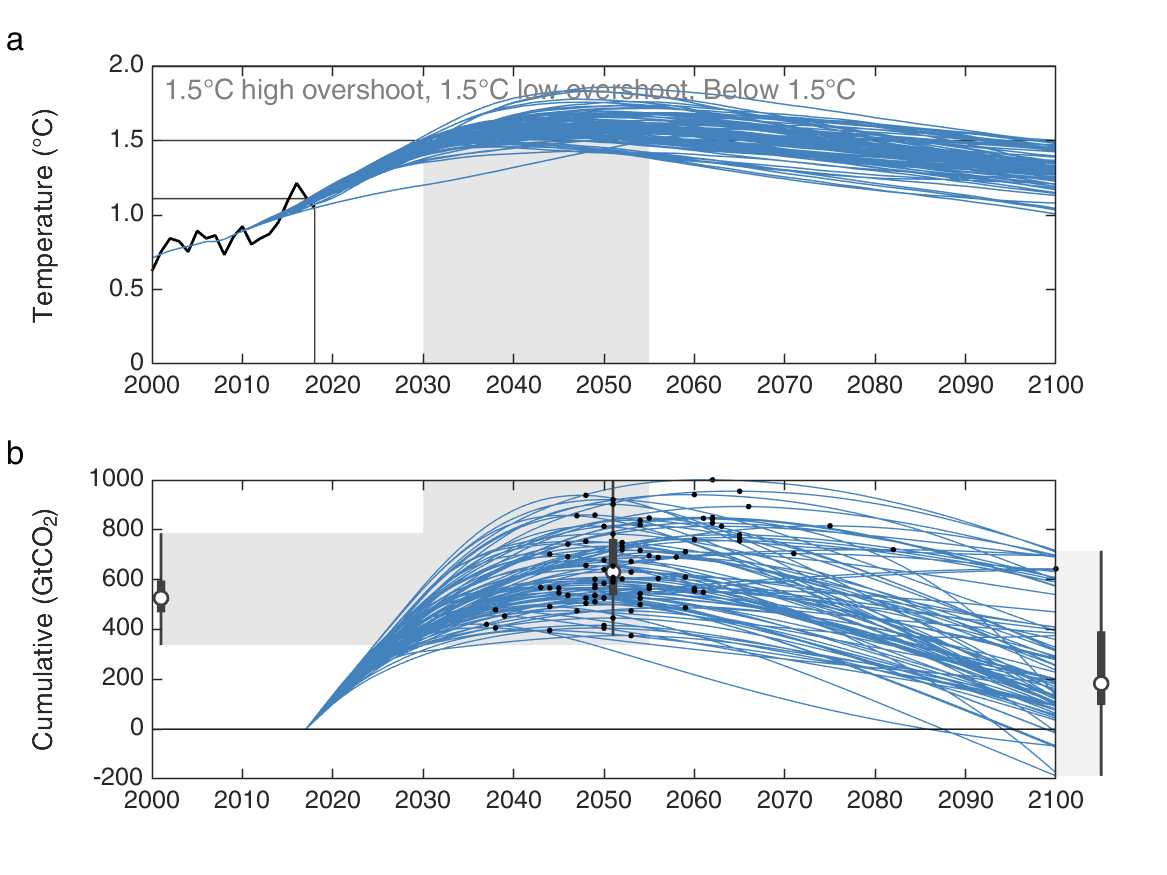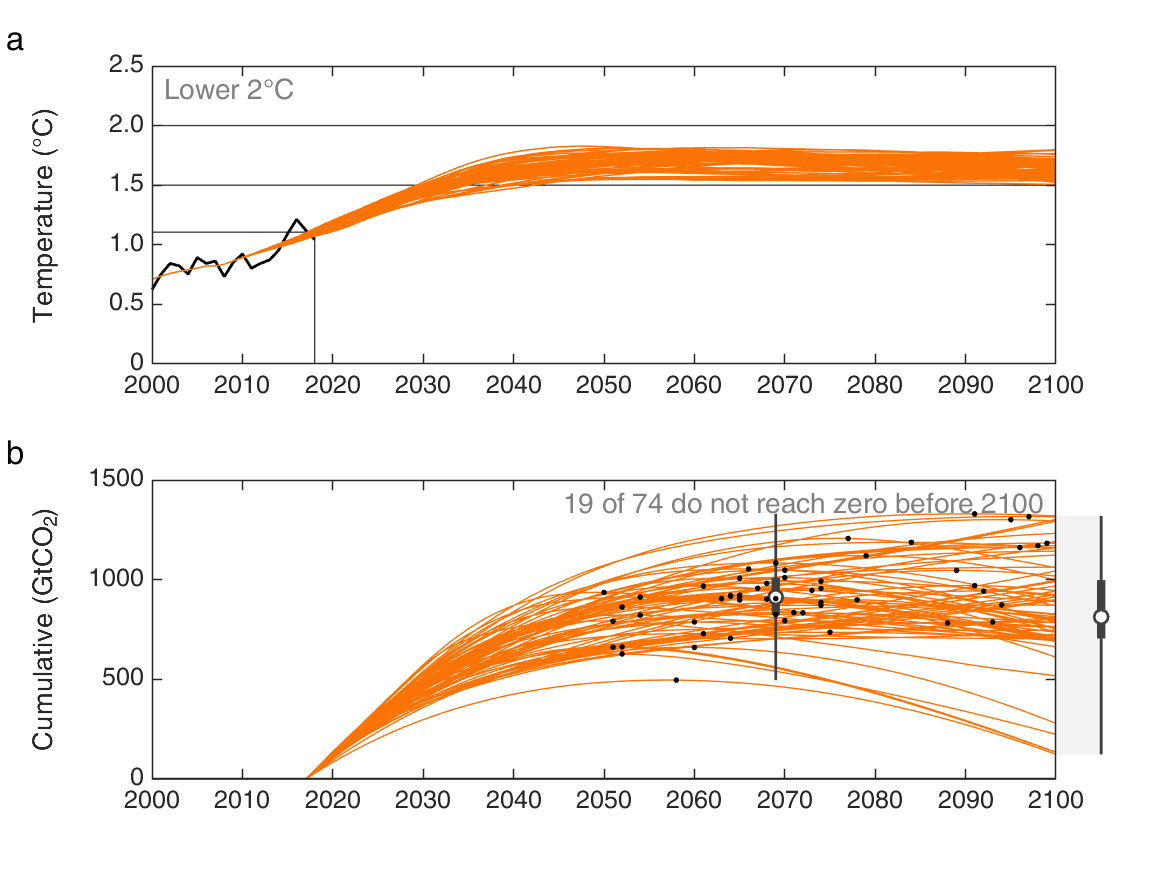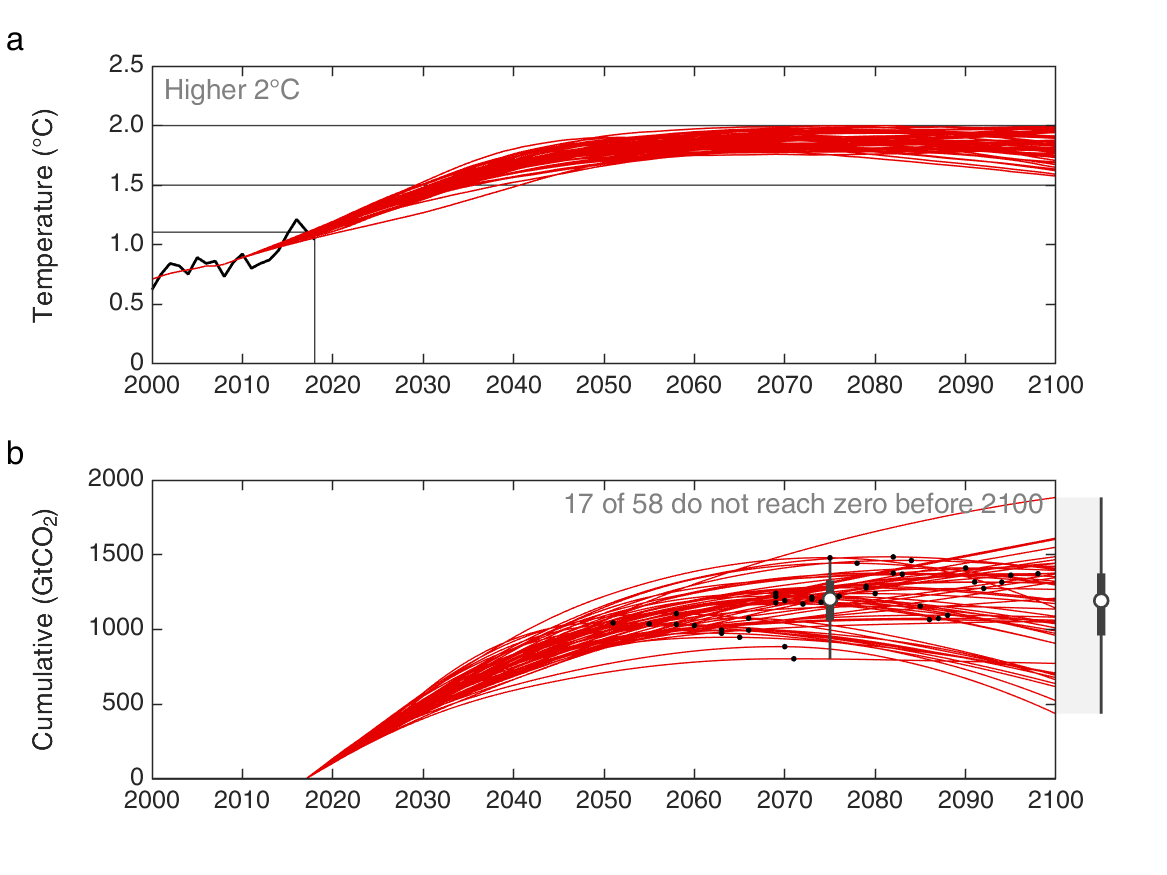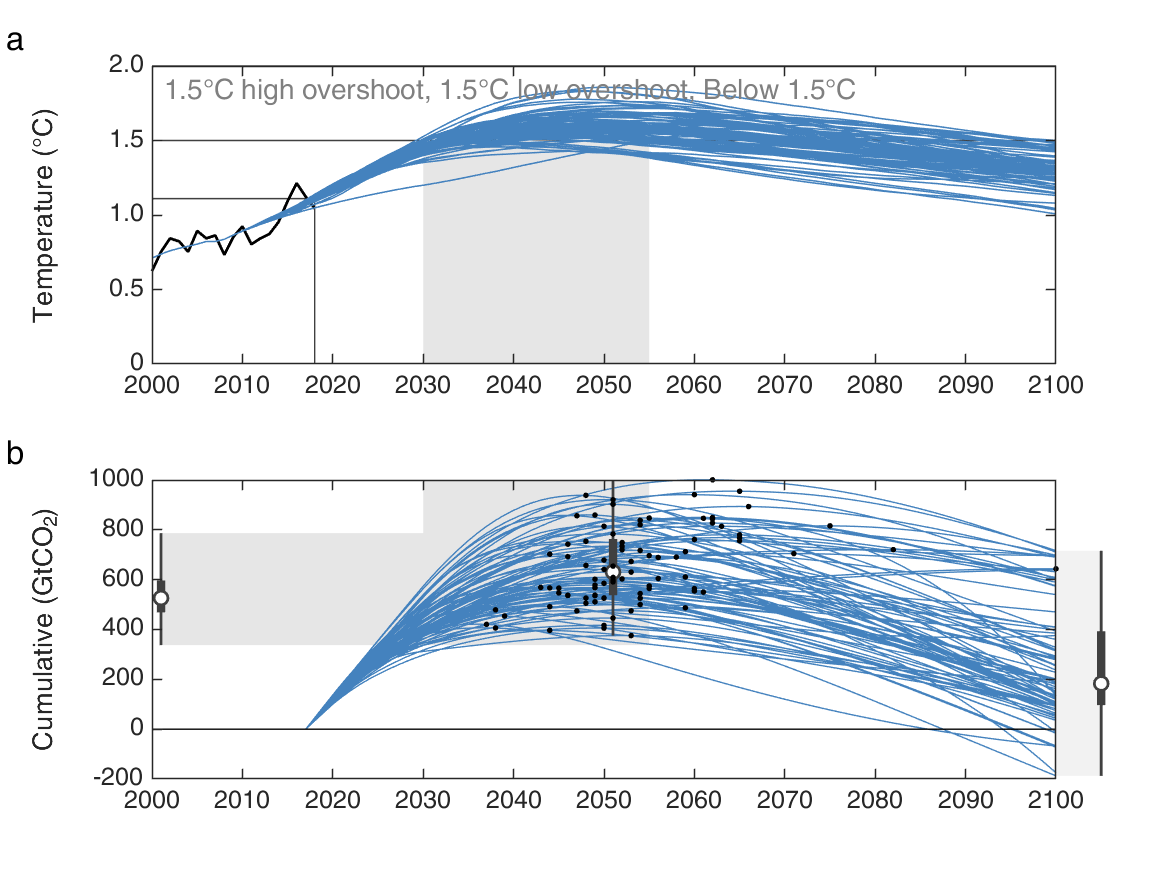THREAD on Carbon Budgets
The & #39;Carbon Budget& #39; is the cumulative CO₂ emissions from one point in time to another given a temperature limit, such as exceeding 1.5°C, reaching net-zero (~peak temperature), or to (say) 2100 for a 1.5°C scenario.
https://cicero.oslo.no/no/posts/klima/beyond-carbon-budgets">https://cicero.oslo.no/no/posts/...
The & #39;Carbon Budget& #39; is the cumulative CO₂ emissions from one point in time to another given a temperature limit, such as exceeding 1.5°C, reaching net-zero (~peak temperature), or to (say) 2100 for a 1.5°C scenario.
https://cicero.oslo.no/no/posts/klima/beyond-carbon-budgets">https://cicero.oslo.no/no/posts/...
2. The #IPCC #SR15 had different categories of scenarios.
The & #39;Below 1.5°C& #39; scenarios never exceeded 1.5°C (no & #39;exceed& #39; budget), but they all reach net-zero CO₂ emissions leading to a & #39;net-zero& #39; or & #39;peak& #39; budget (as peak cumulative CO₂ occurs at net-zero CO₂ emissions).
The & #39;Below 1.5°C& #39; scenarios never exceeded 1.5°C (no & #39;exceed& #39; budget), but they all reach net-zero CO₂ emissions leading to a & #39;net-zero& #39; or & #39;peak& #39; budget (as peak cumulative CO₂ occurs at net-zero CO₂ emissions).
3. Most 1.5°C scenarios exceed 1.5°C, reach a peak temperature (over 1.5°C), & then decline back below 1.5°C (peak & decline scenarios).
How to define the budget? A net-zero budget is a clear definition, but corresponds to ~peak temperature (eg 1.7°C) & varies a factor of two!
How to define the budget? A net-zero budget is a clear definition, but corresponds to ~peak temperature (eg 1.7°C) & varies a factor of two!
4. A carbon budget definition that is nice for 1.5°C scenarios, may not work for 2°C scenarios.
Around one-quarter of 2°C scenarios (>66% chance) do not go below zero CO₂ emissions before 2100, so the & #39;net-zero budget& #39; is undefined.
Around one-quarter of 2°C scenarios (>66% chance) do not go below zero CO₂ emissions before 2100, so the & #39;net-zero budget& #39; is undefined.
5. Including all 2°C scenarios (50% & 66%) also leads to about one-quarter of scenarios that avoid 2°C, but do not need net-zero emissions.
Thus, a good carbon budget definition for 1.5°C peak & decline scenarios may not be so good for 2°C stabilisation scenarios...
Thus, a good carbon budget definition for 1.5°C peak & decline scenarios may not be so good for 2°C stabilisation scenarios...
6. Carbon budgets are uncertain under all definitions.
These budgets are based on one climate model (MAGICC) using IPCC SR15 1.5°C scenarios:
* Net-zero budget varies a factor of two
* Cumulative to 2100 includes negative & #39;budgets& #39;!
Non-CO₂ important driver for variations!
These budgets are based on one climate model (MAGICC) using IPCC SR15 1.5°C scenarios:
* Net-zero budget varies a factor of two
* Cumulative to 2100 includes negative & #39;budgets& #39;!
Non-CO₂ important driver for variations!
7. The & #39;carbon budget& #39; concept is an excellent way to explain the climate challenge, but quantifying them is a difficult business (particularly for 1.5°C which is so close).
Different definitions have different purposes, but I think that is ok! We can handle it!
Different definitions have different purposes, but I think that is ok! We can handle it!
8. Are the uncertainties / variations a problem?
They perhaps limit the policy utility of the quantified budgets, but they also open opportunities. Understanding the variations in budgets may give insights into non-CO₂ emissions & other policy relevant aspects.
They perhaps limit the policy utility of the quantified budgets, but they also open opportunities. Understanding the variations in budgets may give insights into non-CO₂ emissions & other policy relevant aspects.
9. This blog is from 2018, but is still relevant today (figures updated in this thread).
Blog: https://cicero.oslo.no/no/posts/klima/beyond-carbon-budgets
Commentary:">https://cicero.oslo.no/no/posts/... https://rdcu.be/bHT2C
Also">https://rdcu.be/bHT2C&quo... see @Oliver_Geden: https://www.nature.com/articles/s41561-018-0143-3
/end">https://www.nature.com/articles/...
Blog: https://cicero.oslo.no/no/posts/klima/beyond-carbon-budgets
Commentary:">https://cicero.oslo.no/no/posts/... https://rdcu.be/bHT2C
Also">https://rdcu.be/bHT2C&quo... see @Oliver_Geden: https://www.nature.com/articles/s41561-018-0143-3
/end">https://www.nature.com/articles/...

 Read on Twitter
Read on Twitter